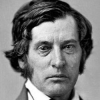Charles Sumner

Charles Sumner
Charles Sumnerwas an American politician and senator from Massachusetts. As an academic lawyer and a powerful orator, Sumner was the leader of the antislavery forces in Massachusetts and a leader of the Radical Republicans in the United States Senate during the American Civil War working to destroy the Confederacy, free all the slaves, and keep on good terms with Europe. During Reconstruction, he fought to minimize the power of the ex-Confederates and guarantee equal rights to the freedmen...
NationalityAmerican
ProfessionPolitician
Date of Birth6 January 1811
CountryUnited States of America
The thought of going abroad makes my heart leap.
I am without religious feeling.
Without security, civilization is cramped and dwarfed. Without security, there can be no freedom. Nor shall I say too much, when I declare that security, guarded of course by its offspring, freedom, is the true end and aim of government.
The highest greatness, surviving time and stone, is that which proceeds from the soul of man. Monarchs and cabinets, generals and admirals, with the pomp of court and the circumstance of war, in the lapse of time disappear from sight; but the pioneers of truth, though poor and lowly, especially those whose example elevates human nature, and teaches the rights of man, so that "a government of the people, by the people, for the people, may not perish from the earth;" such a harbinger can never be forgotten, and their renown spreads co-extensive with the cause they served so well.
Nothing from man's hands, nor law, nor constitution, can be final. Truth alone is final.
A nation cannot afford to do a mean thing.
There are two sorts of pity: one is a balm and the other a poison; the first is realized by our friends, the last by our enemies.
No true and permanent fame can be founded, except in labors which promote the happiness of mankind.
The age of chivalry has gone; the age of humanity has come.
Whether the Union stands or falls, I believe the profession of arms will henceforth be more desirable and more respected than it has been hitherto.
If a man has done evil in his life, he must not be complimented in marble.
Without knowledge there can be no sure progress. Vice and barbarism are the inseparable companions of ignorance. Nor is it too much to say that, except in rare instances, the highest virtue is attained only through intelligence.
The slave power dares anything, and it can be conquered only by the united masses of the people. From Congress to the people, I appeal.
The true greatness of nations is in those qualities which constitute the greatness of the individual.